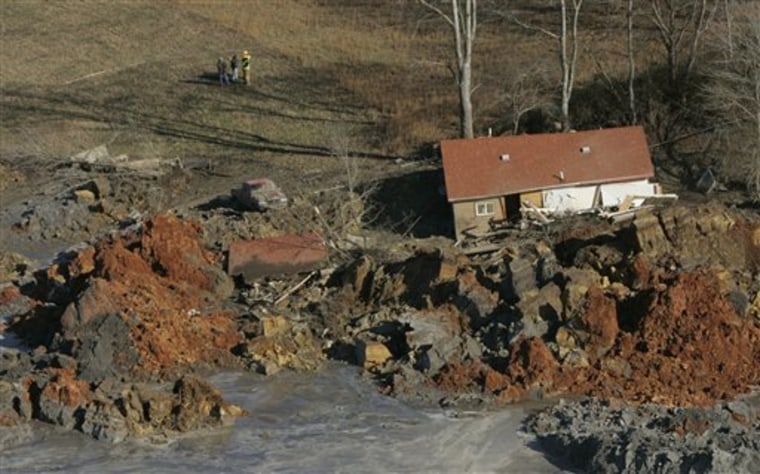A burst dike at a coal-fired power plant in eastern Tennessee spilled twice as much ash as originally estimated, and at least one resident fears the muck coating his neighborhood is endangering the area's drinking water.
About 5.4 million cubic yards of coal fly ash, a byproduct of burning coal, broke out of a retention pond at the Kingston Fossil Plant, a Tennessee Valley Authority spokesman said Friday. The TVA, the nation's largest utility company, first estimated the amount at about 2.6 million cubic yards after Monday's breach in eastern Tennessee.
"I'm not clear if that 2.6 (million) represented the whole ash spill or just the holding area," said spokesman John Moulton. "I am trying to run down why the numbers are different."
Despite the increase, TVA's first tests showed no threat to the area's drinking water supply, Moulton said. And crews were working to clean the sludge from the water and from as much as 300 acres of land. The spill damaged 12 homes in a neighborhood in Harriman, about 35 miles west of Knoxville.
Results of water sampling downstream of the plant, including at Kingston Water District intake, indicate that the concentrations of toxic contaminants were below state standards to protect fish and aquatic life, according to a TVA news release Thursday. The plant is along the Emory River, which joins the Clinch River and flows into the main Tennessee River.
Moulton said there is no reason the water would not meet drinking water standards.
Landowner doesn't trust TVA
But Christopher Copeland, a resident whose land is covered in ash and debris, said he thinks TVA is more concerned about reopening railroad lines to keep the plant supplied with coal than his family's safety.
"They have done nothing to address our issues," Copeland said by phone Friday from his home on a road partially closed because of the spill.
Copeland said he is not drinking the local water and is keeping his children inside until he can send them to a relative's house, "because I don't feel comfortable with them around here."
Environmental activist groups said this week they also worry about the danger to drinking water and criticized the TVA for the breach.
An Environmental Protection Agency spokeswoman has said some toxic metals could be in the muck, including mercury and arsenic. But the EPA tests were not finished. Dead fish were seen floating downstream, but the TVA said that could have been caused by the freezing temperatures that may have contributed to the dike bursting.
Meanwhile, environmental activists at Greenpeace are asking for a criminal investigation into the failure of the pond and whether TVA could have prevented the spill. The pond is used for dumping a slurry of waste from burning coal at the steam plant, the TVA has said.
Rick Hind, the agency's legislative director, said the new ash-spill estimate shows the TVA doesn't know what is going on. Hind said the utility could be subject to penalties under the Clean Water Act and said similar spills have resulted in felony charges.
Eyes on rising water
Copeland's house was not damaged, but his neighbor's was destroyed. Copeland is also keeping a watchful eye on a nearby cove that he says is normally 8 feet deep with water. He estimates it's now up to 16 feet and looks like it will eventually overflow.
"What I am kind of worried about is that it is steadily getting higher with the rain and the ash is blocking any drainage," Copeland said. "If it runs over then we will probably be up to water in the house."
TVA is analyzing data from an aerial survey to determine the amount of ash in various locations. They estimated that 78,000 cubic yards of ash are on some railroad tracks and a residential road.
"We are cleaning it up," Moulton said. "That's where our efforts are focused and we are making some headway. Both on land and in the water, we are containing it and skimming it off the water."
Knoxville-based TVA supplies electricity to 8.8 million consumers in Tennessee, Mississippi, Alabama, Kentucky, Georgia, North Carolina and Virginia.
